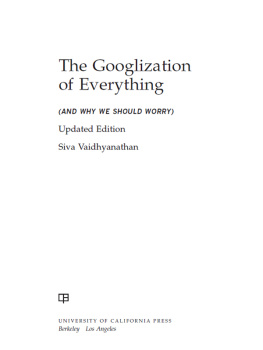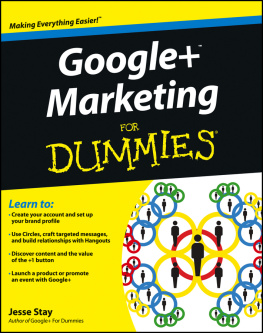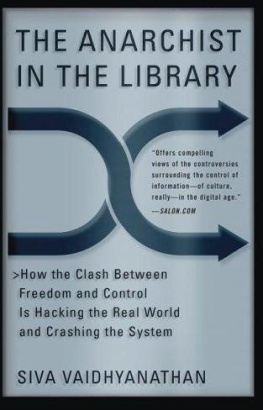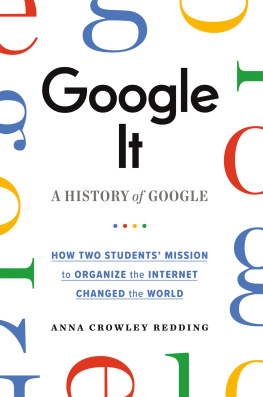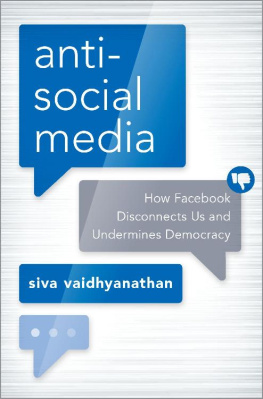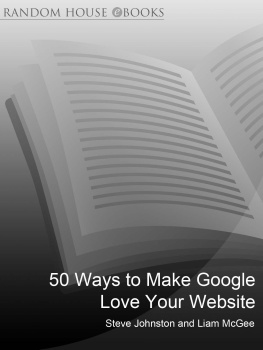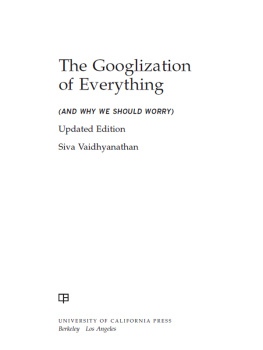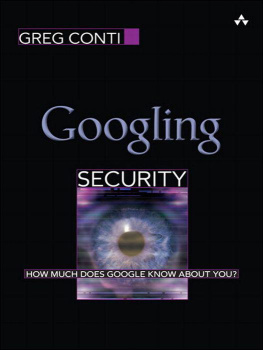The Googlization of Everything
The publisher gratefully acknowledges the generous support of the General
Endowment Fund of the University of California Press Foundation.
The Googlization of Everything
(AND WHY WE SHOULD WORRY)
Updated Edition
Siva Vaidhyanathan

UNIVERSITY OF CALIFORNIA PRESS
Berkeley Los Angeles
University of California Press, one of the most distinguished university presses in the United States, enriches lives around the world by advancing scholarship in the humanities, social sciences, and natural sciences. Its activities are supported by the UC Press Foundation and by philanthropic contributions from individuals and institutions. For more information, visit www.ucpress.edu.
University of California Press
Berkeley and Los Angeles, California
2011 by Siva Vaidhyanathan
First paperback printing 2012
Library of Congress Cataloging-in-Publication Data
Vaidhyanathan, Siva.
The Googlization of everything : (and why we should worry) / Siva Vaidhyanathan.
p. cm.
Includes bibliographical references and index.
ISBN 978-0-520-27289-7 (pbk : alk. paper)
1. Google (Firm). 2. Internet industrySocial aspects.
3. InternetSocial aspects. I. Title.
HD9696.8.U64G669 2010
338.76102504dc22
2010027772
Manufactured in the United States of America
20 19 18 17 16 15 14 13 12
10 9 8 7 6 5 4 3 2 1
This book is printed on Cascades Enviro 100, a 100% post consumer waste, recycled, de-inked fiber. FSC recycled certified and processed chlorine free. It is acid free, Ecologo certified, and manufactured by BioGas energy.
For Jaya,
who is learning to be patient in a very fast world
It does not break wills, but it softens them, bends them, and directs them; it rarely forces one to act, but it constantly opposes itself to ones acting; it does not destroy, it prevents things from coming into being; it does not tyrannize, it hinders.
Alexis de Tocqueville
CONTENTS
PREFACE
Google seems omniscient, omnipotent, and omnipresent. It also claims to be benevolent. Its no surprise that we hold the company in almost deific awe and respect. But what do we gain and what do we lose by inviting Google to be the lens through which we view the world? This book describes the nature of that devotion as well as a growing apostasy, and it suggests ways we might live better with Google once we see it as a mere company rather than as a force for good and enlightenment in the world.
We may see Google as a savior, but it rules like Caesar. The mythology of the Web leads us to assume that it is a wild, ungovernable, and thus ungoverned realm. This could not be further from the truth. There was a power vacuum in the Web not so long ago, but we have invited Google to fill it. Overwhelmingly, we now allow Google to determine what is important, relevant, and true on the Web and in the world. We trust and believe that Google acts in our best interest. But we have surrendered control over the values, methods, and processes that make sense of our information ecosystem.
This book argues that we should influenceeven regulatesearch systems actively and intentionally, and thus take responsibility for how the Web delivers knowledge. We must build the sort of online ecosystem that can benefit the whole world over the long term, not one that serves the short-term interests of one powerful company, no matter how brilliant.
Still, questioning the role of Google in our lives and the faith we have in it is not easy. Google does much good and little direct harm to most people. And I did not expect to be the person to do this job. From the early days of personal computers, I counted myself among the champions of all things digital and networked. I saw great transformative, democratizing potential in the technological changes of the past three decades. In the 1990sheady days of global prosperity, burgeoning freedom, and relative peaceI saw in digital networks the means to solve some of the problems we faced as a species. Back then I took seriously the notion that the world had stepped beyond the stalemate of the Cold War and had settled on a rough consensus on competitive open markets, basic human rights, and liberal democracyeven if the road to those goals was still long and rocky in much of the world. I assumed digitization would level the commercial playing field in wealthy economies and invite new competition into markets that had always had high barriers to entry. I imagined a rapid spread of education and critical thinking once we surmounted the millennium-old problems of information scarcity and maldistribution.
But in the early part of this century, my mood soured and my enthusiasm waned. I saw my great hopes for an open and free Internet corrupted by the simultaneous pressures of inadequate security (in the form of fraud, spam, viruses, and malware) and the attempts at a corporate lockdown of culture and technology. I worried that the environment generated by the global reach of the Internet was pulling us in opposite directionstoward both anarchy and oligarchyand draining the institutions and environments that would foster more
reasonable, republican virtues, such as measured deliberation, critical thought, and mutual respect.
So I sought a way to explore both my disenchantment with and my approval of changes in our global information ecosystem. I wanted to embrace and champion values and goals such as liberty, creativity, and democracy while offering criticisms of trends and trajectories that I consider harmful or dangerous, such as blind faith in technology and market fundamentalism. And Google exemplifies all these trends.
Because books move more slowly than large, rich Internet companies, I have not attempted to catalog or analyze the companys recent initiatives. Instead, I have tried to discern broad and significant themes and patterns that should hold constant for some years. If Google has dramatically changed course between the date that I finished this text and the date you begin reading it, I apologize in advance. Tracking Google was never my goal; instead, I seek to explain why and how Google tracks us.
Previous books about Google have focused, understandably, on the companys rise and triumph. They have revealed the unique story, culture, and principles that have made Google one of the most pervasive and important institutions in the world. These books have exposed the inner workings of the company, its bold technologies, its brilliant methods of generating revenue, the peculiar vision of its founders, the talents of its chief operating officer, and the revolutionary nature of its approach to making sense of the Internet. I could not write a biography of the company or an exploration of the science of Web search; there are already many excellent examples of such projects. Nor could I write a primer on how one might replicate or learn from Googles success; another recent book fulfills that function. Nor does this book purport to get inside the minds of the visionaries who run the company, as other, more connected writers have.
This book is not about Google; instead, it is about how we use Google. It explains the ways we have embraced Google and invited it into a wide variety of human activities. It also examines the resistance to and concern about Google, which is growing as its reach spreads across the globe. It explores the terms of the relationships between Google and its billions of users, and it considers the moral consequences of Googles actions and policies.
This book is much more about ushow we use Google, what we expect of it, and what we give to itthan about Google. My modest hope is that you will approach that screen with the friendly search box and clever logo with a keener sense of what happens when you type the name of the thing youre looking for. To search for something on the Web using Google is not unlike confessing your desires to a mysterious power. If nothing else, I hope to deflate hyperbole about the company, its services, and the Web in general, and to shift the tone of public conversation from one of blind faith and worship of the new to one of sober concern about the wrenching changes we have invited and unleashed. Most of all, I hope we will all approach the future of human knowledge with wisdom and trepidation rather than naive, dazzled awe.
Next page
